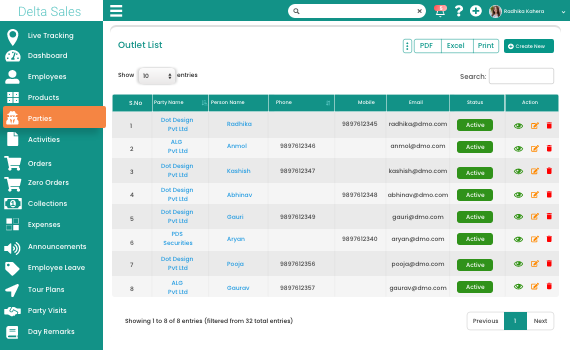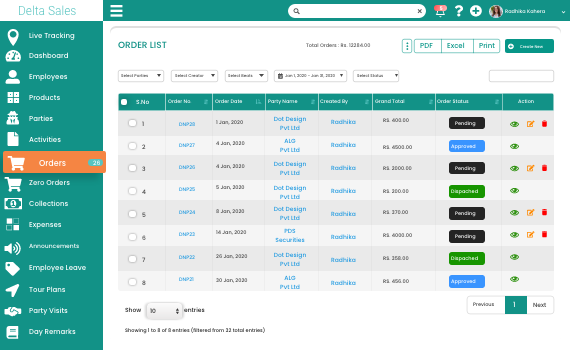What is Distribution Management Software & Why Your Business Needs It

In today’s fast-moving business landscape, efficient distribution has become a competitive advantage. Companies are no longer judged only by the quality of their products but also by how quickly, reliably, and cost-effectively they can deliver them to retailers and end customers.
This is where distributor management software (DMS) steps in. By automating, tracking, and optimizing distribution processes, DMS ensures smoother operations across the supply chain.
In this guide, we’ll explore what distributor management software is, its key features, benefits, and why businesses across industries are increasingly adopting it.
What is Distribution Management Software?

Distributor management software is a comprehensive digital solution that streamlines the complete distribution process from order placement to final delivery at retailers. It gives businesses real-time insights into inventory levels, sales performance, distributor activities, and logistics operations.
Key objectives include:
-
Automating repetitive distribution tasks to save time and resources.
-
Tracking orders, inventory, and field sales efficiently.
-
Optimizing delivery routes and schedules for timely fulfillment.
-
Maintaining accurate, consistent data across manufacturers, distributors, and retailers.
Unlike conventional methods relying on spreadsheets, phone calls, and manual updates, DMS provides data-driven accuracy and operational control, reducing errors, cutting costs, and boosting overall efficiency.
Key Features of Distributor Management Software
Distributor management software (DMS) comes with a suite of features that cover every aspect of the distribution lifecycle. These features help businesses reduce manual errors, optimize processes, and improve efficiency:
-
Order & Inventory Management: Automatically tracks stock levels, manages replenishment, and processes orders efficiently. Businesses can avoid overstocking or stockouts, forecast demand, and maintain the right product levels at all times.

-
Route Planning & Delivery Optimization: Uses intelligent algorithms to plan the fastest delivery routes, minimize transportation costs, and ensure timely deliveries, improving customer satisfaction.
-
Sales & Field Force Tracking: Monitors field sales activities, visit frequency, and performance metrics. GPS tracking ensures accountability and helps managers optimize field operations.
-
Retailer & Distributor Management: Maintains detailed records of distributor and retailer transactions, pricing agreements, and performance metrics. This helps maintain strong B2B relationships and streamlines communications.
-
Payment Collection & Reconciliation: Tracks pending payments, generates invoices automatically, and reconciles accounts to reduce manual errors and delays.
-
Analytics & Reporting: Provides insights into sales trends, inventory levels, distributor performance, and market demand, enabling businesses to make data-driven decisions.
-
Integration with ERP/CRM: Ensures seamless integration with enterprise resource planning and customer relationship management systems, creating a unified ecosystem for smooth operations.
Why Businesses Need Distributor Management Software
Managing distribution manually often leads to challenges like delayed deliveries, stockouts, lack of transparency, and inefficient operations. Distributor Management Software (DMS) solves these issues by automating processes, providing real-time insights, and improving collaboration across the supply chain.
For Manufacturers: DMS offers complete visibility of products across distributors and retailers, helping manufacturers plan production, monitor stock movement, and fulfill orders faster while reducing inventory holding costs.
For Distributors/Wholesalers: It simplifies inventory management, ensures timely deliveries, and minimizes operational overhead. Distributors can always maintain optimal stock levels in the right locations, avoiding shortages or overstock situations.
For Retailers: Retailers benefit from consistent product availability, reducing lost sales opportunities and keeping customers satisfied with timely supply.
For Sales Teams: Automated reporting and real-time updates reduce administrative work, allowing sales teams to focus on driving revenue and strengthening distributor and retailer relationships.
By implementing DMS, businesses create a well-coordinated, error-free supply chain that improves operational efficiency, enhances visibility, and drives growth across all stakeholders.
Benefits of Using Distributor Management Software
The adoption of Distributor Management Software (DMS) brings several measurable advantages that help businesses streamline operations, reduce costs, and increase revenue. Here are the key benefits:
Reduced Operational Costs : Automation minimizes manual work and reduces errors caused by spreadsheets or miscommunication. It eliminates resource wastage such as idle staff time, excess inventory, and unnecessary fuel costs. Overall, businesses save money and can reinvest in growth initiatives or expansion.
Faster Order Fulfillment : Orders are processed and dispatched automatically, reducing delays caused by manual approvals. Real-time inventory tracking ensures products are always available for timely delivery. Quicker fulfillment improves operational efficiency and accelerates cash flow for the business.
Increased Sales Productivity : Sales teams spend less time on administrative tasks like reporting or stock checks. They can focus on revenue-generating activities and plan visits more effectively. This results in higher sales efficiency and better coverage of target territories.
Enhanced Supply Chain Visibility: Managers can monitor inventory, shipments, and distributor performance from one dashboard. Real-time insights help identify bottlenecks before they impact operations. Better visibility enables accurate forecasting, resource allocation, and proactive planning.
Better Decision-Making : DMS provides actionable insights from sales, inventory, and distributor data. Businesses can optimize stock allocation, adjust pricing, and identify demand trends. Decisions become data-driven and forward-looking, giving companies a competitive edge.
Improved Customer Satisfaction : Products are delivered on time and in the right quantities, reducing stockouts. Retailers receive timely updates on orders, enhancing transparency and trust.
Reliable delivery and service strengthen relationships, encouraging repeat business.
Types of Businesses That Can Benefit from Distributor Management Software
Distributor Management Software (DMS) is valuable for any organization that relies on distributors, retailers, or has a multi-level supply chain. While its applications are versatile, certain industries see particularly significant benefits:
-
FMCG & Consumer Goods: Handles large volumes of fast-moving products efficiently, ensuring timely deliveries and minimizing stockouts at retail outlets.
-
Pharmaceuticals: Supports batch tracking, regulatory compliance, and ensures that essential medicines reach distributors and pharmacies without delays.
-
Beverages: Optimizes seasonal and high-demand product distribution, maintaining stock levels and product freshness.
-
Electronics & Appliances: Helps manage high-value inventory, reduces losses, and improves coordination with distributors and retailers.
-
Telecom: Tracks devices, accessories, and prepaid products across multiple regions, streamlining distributor operations.
-
Automotive Parts: Manages complex product catalogs and ensures timely deliveries to dealerships, workshops, and service centers.
Distributor Management Software vs. Other Business Tools
DMS is sometimes confused with other enterprise tools, but it serves a unique role:
-
DMS vs ERP: ERP manages enterprise-wide functions such as finance, HR, and procurement, whereas DMS focuses specifically on distribution and sales operations.
-
DMS vs CRM: CRM is designed to manage customer relationships, but it does not track inventory, distributor performance, or logistics. DMS fills that gap.
-
DMS vs Field Sales Apps: Field sales apps track employee visits and performance, but DMS integrates sales tracking with inventory, order processing, and analytics, providing a complete distribution solution.
How to Choose the Right Distributor Management Software
Selecting a DMS requires evaluating several factors:
-
Business Size & Needs: Match the DMS capabilities to your organization’s complexity and scale.
-
Scalability & Customization: The software should grow and adapt with your business requirements.
-
Cloud vs On-Premise: Cloud DMS provides flexibility and lower maintenance, whereas on-premise may be suitable for businesses with strict IT policies.
-
Mobile Accessibility: Field teams need access to real-time data on orders, stock, and customer interactions.
-
Integration Capabilities: The DMS should integrate with accounting software for smooth operations.
-
Pricing & ROI: Evaluate the cost versus operational improvements, efficiency gains, and potential sales growth.
Why Choose Delta Sales App for Distributor Management
Delta Sales App is a comprehensive distributor management software that addresses the challenges of modern distribution networks:
-
Inventory & Order Management: Provides stock visibility and automated order processing.
-
Field Sales Tracking: GPS-enabled tracking ensures sales team accountability and efficiency.
-
Retailer & Distributor Management: Streamlines communication and performance monitoring for better relationships.
-
Analytics & Reporting: Offers actionable insights to improve distribution planning and decision-making.
-
Mobile-First Design: Supports on-the-go field teams and scales with business growth.
Delta Sales App allows businesses to optimize their supply chain, reduce errors, and improve profitability, making it an ideal choice for companies looking to modernize distribution operations.
Final Thoughts
Distribution is no longer just about moving goods from Point A to Point B, it has become a critical driver of business success. In today’s highly competitive market, speed, accuracy, and visibility determine whether your products reach retailers and customers on time and in the right condition. Distributor Management Software transforms traditional distribution by streamlining operations, automating workflows, and providing real-time insights that empower smarter decisions.
By minimizing errors, reducing costs, and improving service quality, DMS turns distribution into a strategic advantage. Companies that adopt modern solutions like Delta Sales App can scale efficiently, strengthen distributor and retailer partnerships, and deliver superior customer experience.








